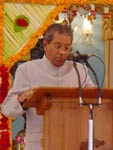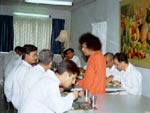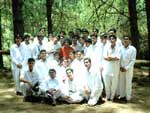| THE KODAIKANAL EXPERIENCE
( PART 3 OF 3)
RENDEZVOUS WITH ANIL KUMAR
Introduction:
It is said that Prasanthi Nilayam
is Swami’s office, Brindavan is His home and Kodaikanal
is His playground. In a manner of speaking, this is so particularly
where Kodaikanal is concerned, for it is here, that one gets
a glimpse of the Sai of the Forties, especially where Divine
Leelas are concerned. It all
lasts only a few weeks, but what extraordinary weeks they
are, for those blessed to enjoy Divine intimacy then!
Kodaikanal is a hill station in South India about
four hundred and odd kilometres south east of Bangalore and
near the Temple Cities of Madurai and Palani. In former years,
every summer Swami used to take a few selected students with
Him to Kodai. To help you to know more about Swami’s
Kodai sojourn, we reproduce below the transcript of a dialogue
between Prof.Anil Kumar and Prof. Venkataraman, broadcast
earlier over Radio Sai. Both are from the SRI SATHYA SAI INSTITUTE
OF HIGHER LEARNING.
( continued from the previous issue)
 GV:
Straw hats? In fact I thing I have a photo of Swami and Narasimhamoorthy
with straw hats. GV:
Straw hats? In fact I thing I have a photo of Swami and Narasimhamoorthy
with straw hats.
AK: Swami got down from His car one day
and purchased a straw hat and put it on His head. When Swami
wore that hat, the whole Kodakanal was soon full of these
straw hats. Bhagavan said, “See they now have plenty
of money and are very happy”. These are all poor people
and they wait for Bhagavan to arrive in Kodai because with
Swami, Lakshmi [the goddess of Wealth] follows and takes care
of their life. And one day, Swami called two servant maids,
very poor ladies, and gave them silk sarees. I was wondering
why.
GV: How did He pick these two women?
AK: They were working there in the Ashram,
washing utensils. Swami gave them silk sarees. I asked, “Swami,
silk sarees for servant maids?” Swami looked at me and
said, “It is I who give; why should you cry (laughter)?
Are you jealous?” I replied, “No, Swami they cannot
afford these silk sarees, I don’t know why You give
them such expensive clothes?” He replied, “So
that they may wear them and attend marriages and such functions.
When they visit relatives wearing these sarees, they would
say, ‘Sai Baba gave this’. That would give them
a lot of joy. Why do you think like that?” Sai loves
everybody and His Love is uniform.
GV: He always tries to make people happy.
AK: Extremely happy.
.
GV: The message is that we also should try
to do that. Tell me how Swami, in subtle ways, teaches the
students. I ask this because you say living with Swami is
an experience. What are the lessons?
AK: He watches how every
student conducts himself and immediately points out deficiencies.
GV: X-ray eyes!
AK: If there is any mistake, He will notice
it. To begin with, dining-table manners, how one should conduct
himself while dining with others. Usually boys serve first.
There are so many points to consider here - how to serve,
how to receive guests, how to extend hospitality, how to talk
to elders, how to dress, all sorts of minute details. These
days, parents do not have the time to observe and teach. They
are busy in their own way. But Bhagavan is more than a parent.
He cares for His boys.With the result the boy becomes so good
that his parents would wonder whether he was the same child.
When they leave home the boys are of one type while when they
come back they are totally transformed. That is the transformation
that Swami produces.
GV: Did you feel it was kind of very strange
that God is doing all this?
AK: Well, God comes down for both for reformation
and transformation. Reformation of the world and transformation
of the inner being.
GV: You say Swami selects boys with talents.
How does He put these talents on display in Kodaikanal?
AK: In many ways. During Bhajans He will
ask them to sing. Later, boys would be asked to play on musical
instruments. Boys with talent for speaking would be asked
to give talks.
GV: Are there some
KAVI SAMMELANS or sessions devoted to poetry?
AK: The Sathya Sai Institute is rather unique
in that we have students from many parts of the country. We
have all together about fifteen languages or so. Thus each
student would compose a poem or a song in his own language.
One day Swami would organise this KAVI SAMMELAN, or an assembly
of poets, rendering their compositions. Swami will tell every
boy, “Come on, sing a song or recite a poem in your
mother tongue.” And while the boy is doing so, Swami
would translate, add explanations and interpretations, besides
correcting the boy wherever he went wrong.
GV: Translating? If it is a Bengali poem
?
AK: He translates all languages.
GV: Then, why does He need you?! Anyway,
this is amazing. Now tell us something about the picnic. That
must be something very unusual.
 AK:
Swami will take the boys to a nearby mountain area in Kodaikanal.
The party would go there with food packets. All would sit
in the form of a circle and Swami would start joking on the
dress and the walking style of boys, besides imitating them,
much to the amusement of every body. It is all quite light-hearted.
Of course, when He pokes fun, it is really to help the boy
to correct his mistakes. He says to one boy, “You are
walking like a lady,” and that boy would know how to
walk properly. He will look at another boy and ask, “Why
you are so fat? You had better do some exercises,” making
everybody laugh. After some bantering like this come the games.
Small slips of paper are prepared with various instructions
written on them, such as: You must dance, you should sing,
you must crack a joke, and so on. The number of slips so prepared
is equal to the number of people seated around in a circle.
A slip is put in a box and the box is passed around while
music plays. Suddenly the music is stopped and the boy holding
the box at that moment has to do exactly what is written on
the slip inside. AK:
Swami will take the boys to a nearby mountain area in Kodaikanal.
The party would go there with food packets. All would sit
in the form of a circle and Swami would start joking on the
dress and the walking style of boys, besides imitating them,
much to the amusement of every body. It is all quite light-hearted.
Of course, when He pokes fun, it is really to help the boy
to correct his mistakes. He says to one boy, “You are
walking like a lady,” and that boy would know how to
walk properly. He will look at another boy and ask, “Why
you are so fat? You had better do some exercises,” making
everybody laugh. After some bantering like this come the games.
Small slips of paper are prepared with various instructions
written on them, such as: You must dance, you should sing,
you must crack a joke, and so on. The number of slips so prepared
is equal to the number of people seated around in a circle.
A slip is put in a box and the box is passed around while
music plays. Suddenly the music is stopped and the boy holding
the box at that moment has to do exactly what is written on
the slip inside.
GV: Everyone gets a slip including Swami?
AK: Including Swami.
GV: Oh, My God!
AK: It so happened, Prof. Sampath was there
in the group. He got a slip. Prof. Sampath is a wonderful
person, a well-known scientist, a man of ready wit and humour,
and a personification of human values. When Prof. Sampath’s
turn came and he looked at the slip inside, it said, “You
should sing a song.” Professor said “Swami, I
cannot sing.” Swami said, “I cannot help you.
You have to follow the rules of the game and do just what
your slip says”. Prof Sampath then pleaded, “Swami,
can I be exempted?” Laughing merrily, Swami said, “No,
no, you should do what is said in the chit”. Professor
started singing in his coarse voice; he was not used to singing
at all, and every body started putting their fingers into
their ears, and plugging their ears so that they don’t
have to hear him. That added to the fun and frolic. Every
body was reeling with laughter.
GV: I remember Prof. Sampath telling me
this story. He did it all in good humour. He is a very sportive
person; a wonderful man. So if you were to summarise this
extraordinary experience that Swami gives in Kodaikanal, how
would you do it?
AK: Well Sir, in Kodaikanal we have a number
of opportunities to put any number of questions to Bhagavan
covering all topics under the sun. Boys also get influenced
by what they see. When they go out with Bhagavan, they see
thousands of devotees waiting for Him by the roadside. That
is when they realise how lucky they are! They say to themselves:
“These people have been waiting since the early hours
of morning in the cold, to have just a glimpse of Bhagavan.
We, on the other hand, are all the time with Swami. We are
so very fortunate.” That is the first reaction. Number
two, Swami watches a boy eating a particular item. He sees
to it that he is served extra. And how He cares for them!
Swami’s extra-ordinary concern and love naturally touch
the boys, and that is what brings about the transformation.
They ask: “What shall I do in return, for all the time
He spends with me, and for all the concern, love that He shows
me? How am I to repay?”
GV: What does Swami say about that?
AK: He says: “I don’t want anything
from you. All I want from you is for you to get a good name
for yourself, for your parents and for your Institute - that
is the way of expressing gratitude to Bhagavan”. That
is what HE says, “Do good, be good, see good,”
- that is the quintessence of His message.
GV: It is so unimaginable. This broadcast
would be heard all over the world and so literally you have
brought Kodaikanal experience to thousands of people all over
the world. We are very grateful to you from Radio Sai, and
we do hope we will have more opportunities to talk to you
on this subject. After your next Kodai trip, you had better
report immediately to our studio here to tell us all about
it!
AK: I eagerly look forward to that opportunity.
GV: At least for that sake, I hope you will
be taken in the next trip! Thank you very much and Sai Ram
AK: Thank you, and Sai Ram.
|